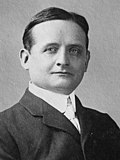| |||||||||||||||||
| |||||||||||||||||
 County results Lodge: 50–60% 60–70% Fitzgerald: 50–60% | |||||||||||||||||
| |||||||||||||||||
| Elections in Massachusetts |
|---|
 |
The 1916 United States Senate election in Massachusetts was held on November 7, 1916. Republican incumbent Henry Cabot Lodge defeated Democratic Mayor of Boston John F. Fitzgerald to win election to a fifth term.
Contents
- Republican primary
- Candidates
- Results
- Democratic primary
- Candidates 2
- Background
- Campaign
- Results 2
- General election
- Candidates 3
- Campaign 2
- Results 3
- Aftermath
- References
- Bibliography
This was the first United States Senate election in Massachusetts decided by popular vote, as required by the Seventeenth Amendment to the United States Constitution.

